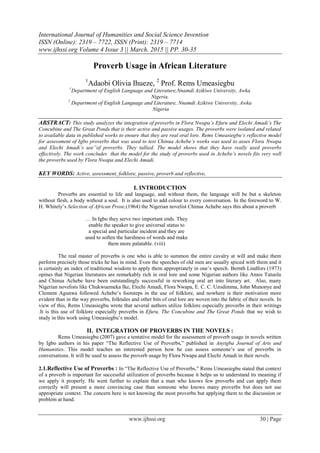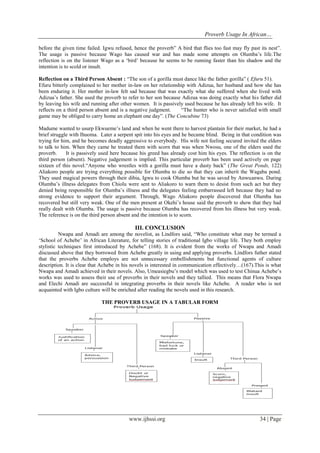This study investigates the use of proverbs in African literature, specifically in Flora Nwapa's 'Efuru' and Elechi Amadi's 'The Concubine' and 'The Great Ponds'. By applying Rems Umeasiegbu’s reflective model for assessing proverbs, the authors demonstrate that both active and passive usages of proverbs enrich the narratives and contribute to thematic depth. The findings suggest that the integration of proverbs in these novels aligns well with traditional oral culture, enhancing their literary artistry.





![Proverb Usage In African…
www.ijhssi.org 35 | Page
REFERENCES
[1] Chinua Acheb. Foreword. Selection of African Prose By W.H Whitely. Oxford: 1964. VII. Df
[2] Bernth Lindfors, Folkore in Nigeria Literature. New York: Africana Publishing Company,1973.
[3] Rems Umeasiegbu. Reflective Use of Proverbs. Anyigba Journal of Arts and Humanities, Vol. 1., No. 1, 2001 15-22
[4] Roger Abrahams. Introductory Remarks to a Rhetorical Theory of Folklore. Journal of American Folklore. 1968.150.
[5] Chinua Achebe. Things Fall Apart. London: Heinemann Publishers Ltd,. 1958.
[6] ………………… Arrow of God. London: Heinemann Publishers Ltd. 1964.
[7] ..…..…………... Girl’s at War and Other Stories. (1972) London: Heinemann Publishers Ltd.
[8] Flora Nwapa. Efuru. Ibadan: Heineman Educational Books Ltd. 1966.
[9] Elechi Amadi. The Concubine. London: Heineman Publishers Ltd.1964.
[10] .…………….. The Great Ponds. London: Heinemann Educational Books Ltd. 1969.Lin](https://image.slidesharecdn.com/f0431030035-150430051929-conversion-gate02/85/Proverb-Usage-in-African-Literature-6-320.jpg)